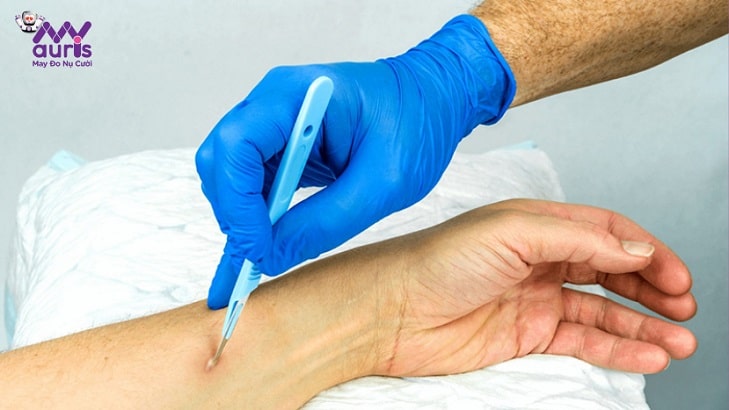An abscess is a condition in which the body is infected, the immune system will do the job of destroying bacteria, thereby forming an outbreak. Pressure will cause pain as well as be dangerous for those with this disease. So what are the causes and how to treat an abscess? Let’s read the article below to find the most suitable treatment!
What is an abscess? Specific cause
An abscess is the formation of a pus pocket formed by the natural immune mechanism. When the body is invaded by bacteria or viruses, the immune system will be activated to eliminate them. Furthermore, white blood cells in the body will be mobilized to the site of infection to perform their task.
Pustule in the abscess contains a mixture, including white blood cells, dead germs and pieces of dead cells.
So the cause is What is the cause of the abscess:
- Common causes are infections, parasitic infections or foreign substances. This will weaken the immune system and reduce the ability to fight infections;
- Less common cases such as chemotherapy, diabetes, cancer, AIDS, sickle cell disease, stomach ulcers, etc.
- Some other causes that need to be mentioned such as poor hygiene and poor circulation also cause abscesses.
When an abscess appears, it will cause some common symptoms such as fever, irritability, red, swollen skin on the outside of the skin, vomiting vomiting, etc. However, there are two common types of abscesses, especially:
- Subcutaneous abscesses (external abscesses): muscle abscesses, tooth abscesses, breast abscesses, etc. Symptoms are often obvious such as swelling, pain in the swollen area, soft swelling and containing pus, etc. Usually, external abscesses are easy to diagnose and treat.
- Abscesses in the body (internal abscesses): for example, perianal abscesses, liver abscesses, lung abscesses, kidney abscesses, etc. often have no clear symptoms and are very difficult to recognize even though there are small changes inside the body. Internal abscesses require diagnostic imaging techniques such as ultrasound and CT scan to be evaluated.

Do abscesses heal on their own?
Abscesses can occur from insect bites, ingrown hairs, clogged oil glands, pimples, cysts or open wounds. Abscesses can appear anywhere on the body. Some small abscesses can drain naturally and on their own. cured without treatment. However, for larger or persistent abscesses, appropriate care is required. Furthermore, if abscesses are not carefully cared for, they will lead to many consequences, specifically:
Infection spreads
When it reaches a certain level Then, the amount of bacteria will grow strongly and overcome the immune system, the inflammation will become more serious. At this time, you will feel pain, especially redness and swelling when pus appears. Furthermore, this case will no longer be controlled and requires medical intervention. Chills. At this time, the abscess site oozes white and hardened pus.
The abscess spreads to other locations.
Bacteria in the abscess have the ability to spread to other locations on the body. However, the most dangerous thing in this case is when the bacteria go deep into the muscle However, in some cases, bacteria can still exist at the abscess site These may not be dangerous. If conditions are favorable, they can multiply and cause the abscess to recur. Taking care of the abscess can completely eliminate the bacteria, you need to prevent reinfection.

How to treat an abscess?
The principle of abscess treatment will depend on the level and depth of the abscess:
- For small abscesses that only affect the skin, the pus can drain out on its own gradually disappear or use medication;
- Large abscesses or those located inside the body are often more dangerous than small abscesses. Therefore, in this case, the doctor will prescribe abscess surgery to solve this infection problem.
- To treat an abscess, the patient needs to go to a medical facility to be diagnosed with the extent and condition of the abscess. From there, doctors will help you have appropriate treatment and direction.
What is the abscess treatment process?
Abscess surgery The main surgical solution is suction or incision to remove pus from the socket, helping infected wounds heal quickly and without causing danger. So what is the procedure for abscess surgery? Below is the surgical procedure to treat an abscess:
- Anesthesia at the abscess area with the purpose of reducing pain for surgery. In addition, you can also suggest taking a sedative dose to relieve pain;
- Apply antiseptic and place sterile towels around the surgical site;
- Make an incision in the tooth socket to remove pus and dead cells. In the case of an internal abscess, the doctor will use a needle to drain all the pus in and out.
- Once all the pus fluid has been removed, surgeons will use gauze to stop the bleeding, and the wound will then heal for 1-2 days. In case of internal abscesses, after removing the pus, the incision will be sutured.
- Next, the doctor will perform surgery on the wound and provide instructions on home care.
- After treatment, the patient will feel comfortable after surgery. If you feel pain, your doctor will prescribe painkillers for 1 – 2 days.
Abscess is a very common form of surgery to resolve infection problems both inside and outside the body. When surgery is needed, patients should choose reliable and reputable surgery locations. Besides, the best advice is to keep healthy eating and living habits to avoid health risks.
Above are answers to questions about whether an abscess will heal on its own. Hopefully this article will provide you with the necessary information.
Kim Dung





